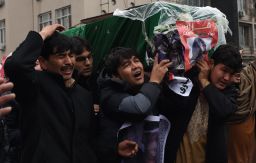Story highlights
The suicide attack targeted minority Hazaras
More than 260 people were wounded
The United Nations described a joint suicide bombing that killed 80 people in Afghanistan as a “war crime,” saying those responsible for the attack on a peaceful demonstration will be held accountable.
ISIS claimed responsibility for the bombing in the capital Saturday.
More than 260 people were wounded, according to Ismail Kawoosi, a spokesman for the Afghan Health Ministry.
United Nations Special Representative to Afghanistan Tadamichi Yamamoto held little back following the attack.
“An attack deliberately targeting a large, concentrated group of civilians amounts to a war crime … It is an attempt to spread terror amongst civilians and stifle the freedoms that Afghans have sacrificed so much to obtain,” Yamamoto said in a statement.
The U.S. and UK also condemned the attack, with the White House saying it was made “all the more despicable by the fact that it targeted a peaceful demonstration.”
Hazara protest bombed
‘Hundreds’ fled scene
“I saw tens of people laying down in blood around me and hundreds of people running away from the scene,” said Fatima Faizi, an Afghan freelance journalist.
Sayed Hamed, 30, attended the protest but left before the explosions. He was about about two kilometers (1.2 miles) away.
“As I was watching (from his hotel) and some (people) were running toward the scene and some were crying coming from the scene,” he told CNN. “It was a very sad situation, and everyone was trying to find their relatives or friends.”
The attack, the worst in months in terms of casualties, drew attention to ISIS instead of the Taliban, which had been blamed for recent bombings.
Two ISIS fighters detonated their suicide belts among the protesters, according to ISIS’ media wing, Amaq. A third attacker was killed by security forces before detonating his bomb, according to an Afghan security official speaking on condition of anonymity.
Minority targeted
The jihadist terrorist group has been stepping up attacks worldwide – and most recently in Afghanistan – while losing territory in its self-proclaimed caliphate in Iraq and Syria.
The blast in Kabul happened during a demonstration by members of the Hazara, a Shiite minority group, near the Afghan Parliament building and Kabul University. Declaring a national day of mourning, Afghanistan President Ashraf Ghani ordered flags in the nation to be flown at half-staff.
Accounting for up to one-fifth of Afghanistan’s population, Hazaras, a Persian-speaking people who mainly live in central Afghanistan, have long been branded outsiders for their Shia faith and far Asian features in the country dominated by followers of the Sunni branch of Islam, according to a 2008 National Geographic article.

Uptick in violence, kidnappings
Saturday’s attack is the latest in a rash of kidnappings and bombings in Kabul, which have heightened security fears in the nation’s capital.
The Taliban have claimed responsibility for other attacks.
Three weeks ago, two Taliban suicide bombers killed 34 people when they attacked a convoy of buses carrying newly graduated police officers in Kabul.
On June 20 in the Afghan capital, a suicide bomber killed 14 Nepali security contractors who worked for the Canadian embassy.
U.S. and other diplomats were barred from traveling by road the short distance from the city’s international airport to their diplomatic missions. Instead, they were ferried by helicopter.
Meanwhile, the 14-year war against the Taliban in the countryside is as bloody as ever. While the Taliban is the dominant insurgent force in the central Asia country, ISIS has been establishing a presence.
U.S. President Barack Obama announced on July 6 that he would slow the planned drawdown of the 9.800 troops supporting the Afghan country because of the precarious security situation, including the emerging threat from ISIS.
In the last 18 months, 38 Americans, civilian and military, have died in the country.
CNN’s Steve Visser reported from Atlanta and CNN’s Masoud Popalzai reported from Kabul


























